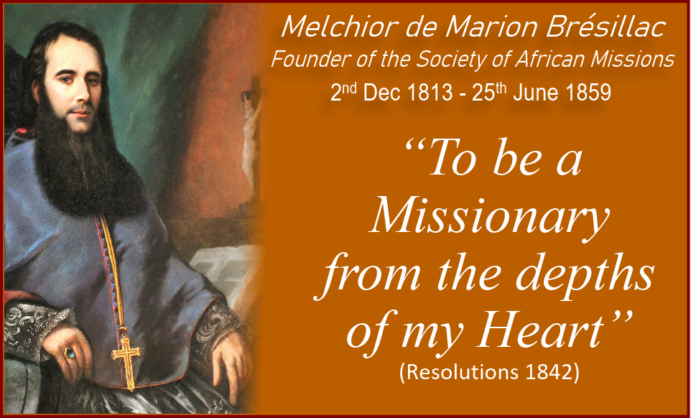(Feast of the Immaculate Conception)
On the Feast of the Immaculate Conception 168 years ago, Mgr Melchior de Marion Brésillac founded the Society of African Missions. In a letter written on the 13th December 1856 to the then Prefect of the Sacred Congregation of Propaganda Fide, Mgr Barnabo, he describes this founding event in the following words:
Eminence,
Although I have not yet received a reply to the letter I had the honour of writing to you about a month ago, I think it useful to let you know that on the Feast of the Immaculate Conception we went, seven of us, to offer our enterprise to the Blessed Virgin, at the foot of her image venerated on the hill of Fourvière. There we renewed our resolution to devote ourselves entirely to the work of the African Missions. And we desire, if the Sacred Congregation so permits, to date the existence of our Society from the 8th December 1856.
These words capture the moment the Society of African Missions was born. It was a moment of profound faith and total generosity, reflecting and repeating the unconditional ‘fiat’ of her under whose protection our Founder placed his new enterprise. At that moment a seed for God’s Kingdom was sown a seed that would yield abundant fruit and call forth hundreds of young men to give their lives to bring the Gospel of Christ to ‘the most abandoned’ in Africa. After more than a century and half, we recall that event with a sense of awe and gratitude. We also strive to recapture something of the sprit that gave us birth as we continue to embrace the challenges of mission today.
It was, I believe, no accident that de Brésillac dedicated his new Missionary Society to the Virgin Mary on the Feast of her Immaculate Conception. The mid-nineteenth century was a high point of Mariological devotion in the Church. Many of the great founders of Missionary Institutes and Religious Congregations in the 19th century laid their dreams at the feet of Mary. Two years before de Brésillac founded the Society of African Missions (1854), Pius IX had capped a great wave of Mariological fervour with the definition of the Dogma of the Immaculate Conception. The Dogma declared that, by the grace of God, and through the merits of Jesus Christ, Mary was preserved free from all sin.
In today’s liturgy, Mary is presented as the one who is without sin, the first beginning of human perfection, in contrast to the first woman, Eve, the mother of all the living, who stands at the first beginnings of our sinful rebellion. In Mary a break is made with our sinful history, and humanity is made newly open to God. The Immaculate Conception signifies that Mary is the first of the redeemed. In her we see what we are called to be, and what we shall be if we respond to this call. Mary, then, is not so much ‘our fallen nature’s solitary boast’, as an old hymn to Mary puts it, as she is our model of true humanity. What God has done in her, God can and will do in us.
It is no accident either that his feast occurs in the Advent Season – when we prepare to celebrate the birth of Jesus Christ, the Son of God. During Advent, Mary is presented as someone who, like any mother, awaits the birth of her child, and bears him in her womb ‘with love beyond all telling’ as the Second Advent Preface states.
One of my favourite images of the missionary is that of a midwife, assisting at the ongoing birth of Christ among new peoples in new places. The task of the midwife is a delicate one, demanding sensitivity and patience as well as courage and skill. We can surely invoke Mary’s help in this task. Who understands better than she the dynamics of birth-giving – that combination of nurturing and caring, of letting go and letting be? We can rely on her teach us how to be good mothers so that Christ may ‘play in ten thousand places/ Lovely in limbs, and lovely in eyes, not his/ To the Father through the features of men’s faces’ (GM Hopkins).
As we continue to serve the mission our Founder entrusted to us at the feet of Our Lady of Fouvière, 168 years ago, may Mary, our Missionary Mother, bless and sustain us all in our commitments and enable us to bear abundant fruit in the harvest fields of God’s Kingdom.
Michael McCabe SMA

